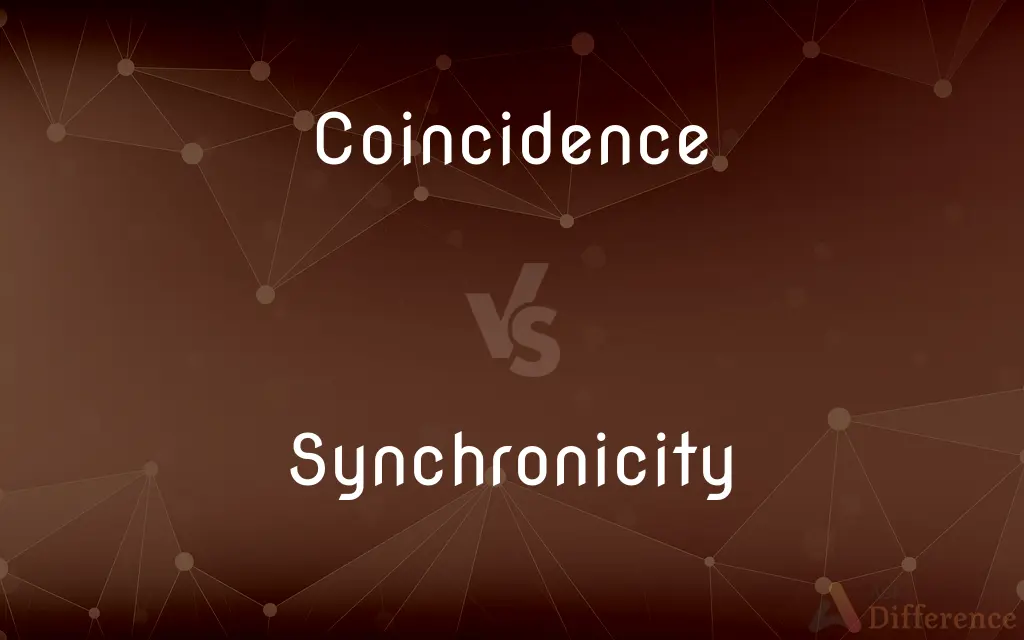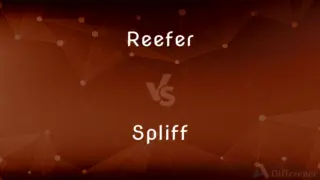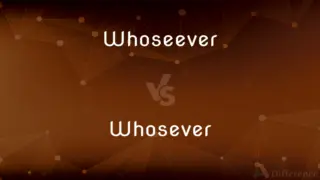Coincidence vs. Synchronicity — What's the Difference?

Difference Between Coincidence and Synchronicity
ADVERTISEMENT
Compare with Definitions
Coincidence
A coincidence is a remarkable concurrence of events or circumstances that have no apparent causal connection with one another. The perception of remarkable coincidences may lead to supernatural, occult, or paranormal claims.
Synchronicity
Synchronicity (German: Synchronizität) is a concept first introduced by analytical psychologist Carl G. Jung "to describe circumstances that appear meaningfully related yet lack a causal connection." Jung held that to ascribe meaning to certain acausal coincidences can be a healthy, even necessary, function of the human mind—principally, by way of bringing important material of the unconscious mind to attention. This further developed into the view that there is a philosophical objectivity or suprasubjectivity to the meaningfulness of such coincidences, as related to the collective unconscious.During his career, Jung furnished several different definitions of the term, defining synchronicity as "a hypothetical factor equal in rank to causality as a principle of explanation", "an acausal connecting principle", "acausal parallelism", and as the "meaningful coincidence of two or more events where something other than the probability of chance is involved".
Coincidence
A remarkable concurrence of events or circumstances without apparent causal connection
They met by coincidence
It was a coincidence that she was wearing a jersey like Laura's
Synchronicity
The state or fact of being synchronous or simultaneous; synchronism.
Coincidence
The fact of corresponding in nature or in time of occurrence
The coincidence of interest between the mining companies and certain politicians
ADVERTISEMENT
Synchronicity
Coincidence of events that appear meaningfully related but do not seem to be causally connected, taken by Jungian psychoanalytic theory to be evidence of a connection between the mind and material objects.
Coincidence
The presence of ionizing particles or other objects in two or more detectors simultaneously, or of two or more signals simultaneously in a circuit.
Synchronicity
(uncountable) The state of being synchronous or simultaneous.
Coincidence
The state or fact of occupying the same relative position or area in space.
Synchronicity
(Jungian psychology) Coincidences that seem to be meaningfully related; supposedly the result of "universal forces".
Coincidence
A sequence of events that although accidental seems to have been planned or arranged.
Synchronicity
The relation that exists when things occur at the same time;
The drug produces an increased synchrony of the brain waves
Coincidence
Of objects, the property of being coincident; occurring at the same time or place.
Coincidence
Of events, the appearance of a meaningful connection when there is none.
That the two writers were born and died on the same day is just a coincidence, although there are many conspiracy theories about it.
Coincidence
(analysis) A coincidence point.
Coincidence
(geometry) A fixed point of a correspondence; a point of a variety corresponding to itself under a correspondence.
Coincidence
The condition of occupying the same place in space; as, the coincidence of circles, surfaces, etc.
Coincidence
The condition or fact of happening at the same time; as, the coincidence of the deaths of John Adams and Thomas Jefferson.
Coincidence
Exact correspondence in nature, character, result, circumstances, etc.; concurrence; agreement.
The very concurrence and coincidence of so many evidences . . . carries a great weight.
Those who discourse . . . of the nature of truth . . . affirm a perfect coincidence between truth and goodness.
Coincidence
An event that might have been arranged although it was really accidental
Coincidence
The quality of occupying the same position or area in space;
He waited for the coincidence of the target and the cross hairs
Coincidence
The temporal property of two things happening at the same time;
The interval determining the coincidence gate is adjustable
Share Your Discovery

Previous Comparison
Reefer vs. Spliff
Next Comparison
Whoseever vs. Whosever













































